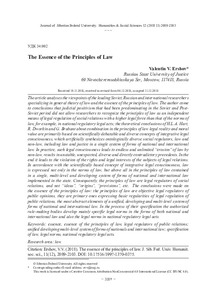The Essence of the Principles of Law
Скачать файл:
URI (для ссылок/цитирований):
https://elib.sfu-kras.ru/handle/2311/109228Автор:
Ershov, Valentin V.
Ершов, В.В.
Дата:
2018-12Журнал:
Журнал Сибирского федерального университета. Гуманитарные науки. Journal of Siberian Federal University. Humanities & Social Sciences;2018 11 (12)Аннотация:
The article analyses the viewpoints of the leading Soviet, Russian and international researchers specializing in general theory of law and the essence of the principles of law. The author come to conclusions that judicial positivism that had been predominating in the Soviet and Post-Soviet period did not allow researchers to recognize the principles of law as an independent means of legal regulation of social relations with a higher legal force than that of the norms of law, for example, in national regulatory legal acts; the theoretical conclusions of H.L.A. Hart, R. Dworkin and G. Brabant about combination in the principles of law legal reality and moral value are primarily based on scientifically debatable and diverse concepts of integrative legal consciousness, which artificially synthesizes ontologically diverse social regulators, law and non-law, including law and justice in a single system of forms of national and international law. In practice, such legal consciousness leads to endless and unlimited “erosion” of law by non-law, results in unstable, unexpected, diverse and directly contradictory precedents. In the end it leads to the violation of the rights and legal interests of the subjects of legal relations. In accordance with the scientifically based concept of integrative legal consciousness, law is expressed not only in the norms of law, but above all in the principles of law contained in a single, multi-level and developing system of forms of national and international law implemented in the state. Consequently, the principles of law are legal regulators of social relations, and not “ideas”, “origins”, “provisions”, etc. The conclusions were made on the essence of the principles of law: the principles of law are objective legal regulators of public opinions, they are primary ones expressing basic regularities of legal regulation of public relations, the most abstract elements of a unified, developing and multi-level system of forms of national and international law. In the process of their specification the authorized rule-making bodies develop mainly specific legal norms in the forms of both national and international law and also the legal norms in national regulatory legal acts В статье анализируются точки зрения многих ведущих советских, российских и зарубежных научных работников, специализирующихся в области общей теории права,
о сущности принципов права. Обоснованы выводы о том, что доминировавший в советский и постсоветский периоды юридический позитивизм не допускал признания
исследователями принципов права в качестве самостоятельного средства правового
регулирования общественных отношений, имеющего более высокую юридическую силу
по сравнению с нормами права, содержащимися, например, в национальных нормативных правовых актах; теоретические выводы Г.Л. Харта, Р. Дворкина и Г. Брэбана
о соединении в принципах права юридической действительности и моральной ценности, прежде всего, основаны на научно дискуссионных и разнообразных концепциях интегративного правопонимания, искусственно синтезирующих в единой системе
форм национального и международного права онтологически разнородные социальные
регуляторы, право и неправо, в том числе право и справедливость. Такое правопонимание на практике приводит к бесконечному и безграничному «размыванию» права
неправом и к нестабильной, неожидаемой, многообразной и прямо противоречивой судебной практике. В конечном результате – к нарушению прав и правовых интересов субъектов правоотношений. В соответствии с научно обоснованной концепцией
интегративного правопонимания право выражается не только в нормах права, но
прежде всего и в принципах права, содержащихся в единой многоуровневой и развивающейся системе форм национального и международного права, реализуемых в государстве. Следовательно, принципы права – это правовые регуляторы обществен-
ных отношений, а не «идеи», «начала», «положения» и т.д. Сделан вывод о сущности
принципов права: принципы права – объективные правовые регуляторы общественных
отношений, являются первичными, выражающими основополагающие закономерности правового регулирования общественных отношений, наиболее абстрактными
элементами единой развивающейся и многоуровневой системы форм национального
и международного права, в процессе конкретизации которых управомоченными правотворческими органами вырабатываются в большей степени определенные нормы
права в формах как национального, так и международного права, в том числе нормы
права в национальных нормативных правовых актах
Коллекции:
Метаданные:
Показать полную информациюСвязанные материалы
Показаны похожие ресурсы по названию, автору или тематике.
-
On the Essence of Legal Obstacles to Exercising and Protection of Legal Rights and Interests: the Problem Statement
Panchenko, Vladislav Yu.; Petrov, Alexander A.; Tolstikh, Anna S.; Панченко, В.Ю.; Петров, А.А.; Толстых, А.С. (Сибирский федеральный университет. Siberian Federal University., 2014-07)Legal obstacles remain to be little-studied in the Russian legal studies, although the expressions “unhindered implementation”, “unhindered exercise” are used as set phrases. This article analyzes essential features of the ... -
Systematicity of Law: Some Problems of Theory and Practice
Shaihutdinov, Evgeny M.; Шайхутдинов, Е.М. (Сибирский федеральный университет. Siberian Federal University., 2015-08)“Systematicity” is the most capacious concept applicable to any object of research, which represents all the possible manifestations of systems. Law is a systemic phenomenon, characterized by an organized structure, which ... -
Единообразное применение законов в контексте постклассического правоведения
Алексеев, И. М.; Alekseev, Igor M. (Сибирский федеральный университет. Siberian Federal University, 2021-11)В статье выявляется бессилие классических правовых теорий объяснить противоречивость практики применения законов. Феноменологическому анализу подвергнута юридическая догматика. Более того, показана ее неспособность преодолеть ... -
Herbert Hart’s Doctrine of Indeterminacy in Law (1949–1961): Main Stages of Development
Kasatkin, Sergei N.; Касаткин, С.Н. (Сибирский федеральный университет. Siberian Federal University, 2018)This article challenges a traditional account of a British philosopher and jurist H.L.A. Hart’s doctrine of indeterminacy in law, according to which this doctrine is associated with the ideas of “open texture” of legal ... -
Restrictions of Constitutional Rights and Freedoms and Legal Obstacles in Their Implementation
Zaitseva, Elena R.; Panchenko, Vladislav Yu.; Зайцева, Е.Р.; Панченко, В.Ю. (Сибирский федеральный университет. Siberian Federal University., 2015-08)The article is devoted to the ratio of restrictions of rights and freedoms and legal obstacles as the phenomena of legal life. It makes conclusions that the legal restrictions of rights and freedoms as a general rule ...

